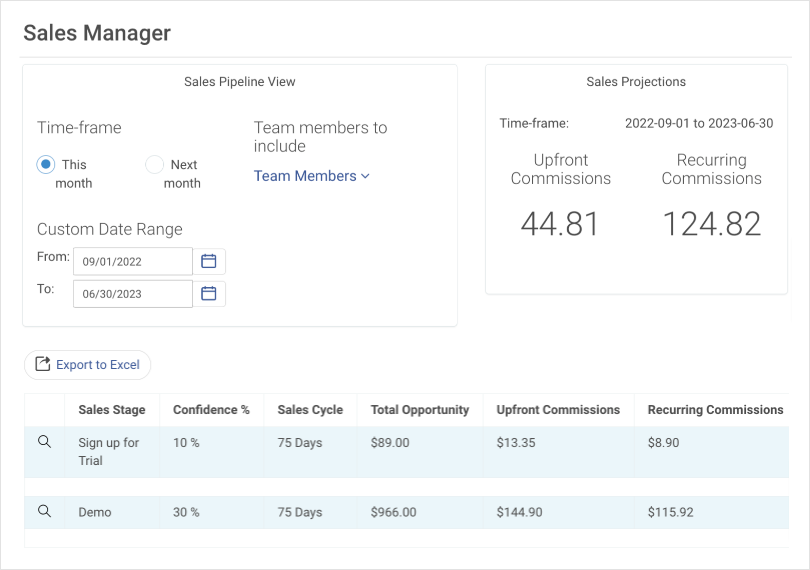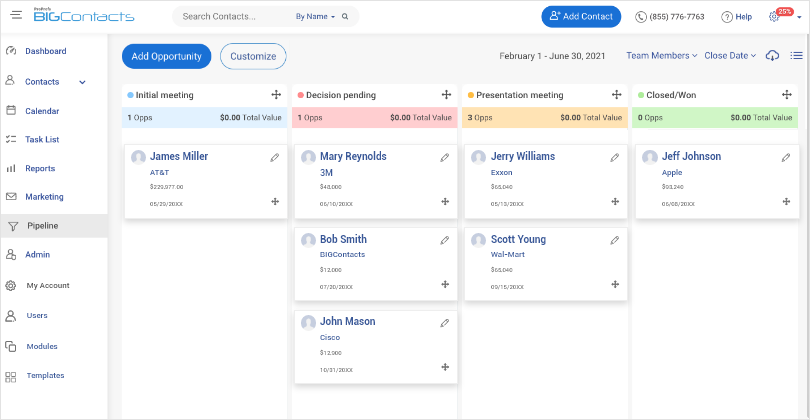Leads represent any individual or business entity that expresses some form of interest in what you are selling.
Maintaining a steady influx of quality leads is a top priority for businesses across the board. Even with the presence of such leads in their sales funnel, some companies see their sales stagnating.
The reason- inefficient tracking and management.
Tracking and organizing leads can help your sales and marketing team considerably. It can provide you with more visibility into your sales pipeline. You can view how you acquire every lead and how it moves through your sales cycle.
However, if you are still relying on spreadsheets to track sales leads, you may be in for a disappointment.
While the method may work for a handful of leads, it does not provide adequate support when you have several leads to manage.
Find out what is a lead tracker and how it can help you track leads to accelerate the growth of your enterprise.
What is a Lead Tracker?
A lead tracker solution allows you to track all sales opportunities by efficiently managing all prospects. It offers valuable insights into your sales process, allowing you to maximize your profitability.
In simple terms, a sales lead tracker helps organize leads captured from multiple sources. The insights gathered from a lead tracker can help businesses make more informed decisions.
It can provide answers to questions such as-
Where is the lead traffic coming from?
How effective are your lead generation campaigns?
How many leads convert into customers?
What practices drive conversions?
Lead tracking can offer you a detailed overview of a lead’s journey. With a lead tracker, you can track various metrics associated with your leads, including their life cycle, average value, deal size, etc. It can help you estimate how close the leads are to conversion and take the necessary steps to accelerate this process.
How Can Lead Tracking Help Your Business?
Before getting into more detail about what is a lead tracker and how the tracking process works, let’s answer the more pertinent question-
How can it help your business?
In its simplest form, lead tracking is the management of all essential data associated with the leads. It can help sales and marketing teams collect and utilize data more efficiently.
With sales lead tracking, you can identify which channels bring you the most qualified traffic and which activities result in their conversion.
The advantages that a business can derive from effective tracking of all of its leads include:
Manage Customer Journeys:
You can better manage customer journeys with a clear idea of where every lead stands in the sales funnel. Keeping track of sales leads position in the pipeline can help you schedule the next action easily. All of this can contribute to improved revenue growth. By optimizing customer journeys, you are more likely to retain them in the long run.
Personalize Experiences:
Tracking leads provides sales teams with relevant information that can help drive conversions. You can identify how the leads contacted your business, identify their pain points and store any other important information that can help personalize your outreach efforts. This can significantly improve your bottom line since 80% of customers prefer making purchases from businesses that offer personalized service.
Make Accurate Forecasts:
Lead tracking offers actionable insights and more visibility into your business. This can help you make more accurate forecasts for your sales and revenue. You can compare the number of opportunities won against the total number of opportunities you work with. This information can help you identify areas where your team’s performance can be improved and help you set better goals for the future.
Calculate ROI:
Lead tracking provides you with tangible data to work with. You can track the performance of your team members and calculate the overall ROI for your business. Analyzing your progress can help you identify opportunities for improvement. A clear picture of business data can be extremely useful in gauging the performance of your business operations.
Improve Marketing Campaigns:
The effectiveness of your marketing campaigns can be measured based on the number of qualified leads they bring in. Sales lead tracking can also help improve marketing campaigns by bridging the gap between sales and marketing teams. Marketing teams can use lead tracking to ensure that they only pass valuable leads to the sales teams.
Significance of Lead Tracking for Sales & Marketing Teams
What a lot of businesses fail to pay adequate attention to is the alignment between sales and marketing.
Your sales and marketing teams have to be on the same page regarding what qualifies as a lead. The lack of this understanding can result in wasted time and effort.
This is where lead tracking can prove to be of advantage.
Lead tracking systems can enable marketing teams to work closely with the sales teams. By promoting this collaboration, lead tracking can help businesses generate more revenue.
Lead tracking allows you to identify marketing opportunities that generate the best leads and utilize this information to allocate marketing resources judiciously. It can help marketing teams gather more qualified leads that the sales team can then convert.
Marketing teams can share insightful data associated with leads to craft better experiences. The sales representatives can benefit from the information passed along, including the lead source and preferences to improve their selling pitch. Such personalization can enhance customer engagement and help your sales team close more deals.
Capturing Leads and Collecting Data
There are a variety of channels for businesses to capture sales leads and their data. These include web forms, social media marketing, offline advertising, inbound calls, targeted ads, third-party sources, etc.
The data collected from the leads includes their needs, preferences, expectations, contact information, and other details.
However, acquiring this data is just half the battle won!
You need to store and manage the data efficiently to drive engagement.
So, how does a business accomplish this?
Most enterprises use a CRM (Customer Relationship Management) tool to manage their leads and associated information.
With an efficient lead tracking system such as a CRM, you can not only store relevant information for your leads but also utilize it to make better decisions. Furthermore, you get complete control over which information is worth capturing.
Read More: 8 Best Small Business CRM
How Does a Lead Tracker Work?
Now that you know what a lead tracker is, let’s see how it actually works.
A lead tracker allows your team to work with critical data and analyze it to find out what drives the most conversions. It can be used to track where the lead came from and track its movement through your sales process. As a result, you can identify the best lead sources and pay more attention to them.
A lead tracker essentially tracks the interactions between your team and leads, right from initial contact to the final decision, to identify opportunities for maximizing profits.
With a lead tracking tool, you can keep lead data organized and readily available. For efficient lead tracking, you first need to define what passes as a good lead. Following this, you need to find the right lead-tracking tool and drive its adoption for your organization. Furthermore, you also need to define key performance indicators for your lead-tracking efforts.
Lead tracking begins when a lead is acquired and continues till the final purchase. A lead tracker can assist you in the following steps of this process:
Capturing:
The captured leads and associated information can be automatically logged into your lead tracking system. This ensures that no opportunity is missed. To make your future interactions much more personalized, you can capture and store essential information, including contact details, source of the lead, buying preferences, etc.
Read More: Lead Generation for Small Business CRM
Qualification:
The next step of the lead tracking process is qualifying the leads based on how they interacted with your initiatives. Effective qualification can help your team focus on high-value deals. A lead tracking tool allows you to view all the information required to qualify the leads.
Scoring:
The leads are assigned a score based on the likelihood of their conversion and the value they can offer to your business. Lead scoring is essential for prioritizing high-value deals. Based on the data obtained from lead scoring, you can determine which lead requires more nurturing and which lead is ready for the next action.
Assigning Leads:
Effective and timely distribution of leads can significantly impact your conversion rates. Even the best leads will prove to be futile if you don’t assign them to the right sales representative. Equitable and accurate distribution of sales leads can help your sales representatives close more deals. Lead tracking enables you to identify which salesperson would be the best suited for a particular lead. You can also monitor the number of opportunities that every sales rep is currently working with.
Tracking progress:
A lead tracker allows you to monitor the progress of leads as they move through the sales cycle. Keeping track of the position of every lead in your sales cycle can significantly improve your personalization efforts. You can easily monitor how close the lead is to making the purchase and identify actions that drive the most conversions.
In simple terms, lead tracking can help remove the guesswork from your sales process and provide you with concrete and consistent data to work with.
Qualifying Sales Leads
Not every lead that you get your hands on is likely to convert. Determining the interest and intent of the lead is thus crucial for your sales team.
With lead qualification, you can focus on high-value leads and prevent them from falling through the cracks. Ascertaining the lead’s interest in your business can save you from wasting time and resources on leads that aren’t ready to make the final purchase. Such leads that have been qualified are termed as Sales Qualified Leads.
A standardized lead qualification process can considerably impact your bottom line. You can qualify leads based on various factors like-
Are they facing particular challenges that your product can solve?
Does your product align with their preferences and expectations?
Who has the final authority to make the purchase decision?
Does your pricing align with the lead’s budget?
Answering these questions can provide a clear picture of how qualified the leads are to make the purchase.
For lead qualification, you have to begin by acquiring the necessary information from the leads. You need to determine their needs, their authority in the purchasing process, and their budget. After this, you can select a qualification technique based on the factors that carry the most significance for your business.
Different businesses use varying techniques and factors for qualifying their leads. Some of the most common of these include-
- BANT: This technique of lead qualification takes into account the budget, authority, needs, and time. In this qualification process, the budget is given the highest priority.
- CHAMP: This technique considers the challenges, authority, money, and prioritization. CHAMP technique places challenges as the most important criteria for the qualification process.
- ANUM: The ANUM method of lead qualification takes into account authority, need, urgency, and money. This method of qualification places authority as the most important criterion, while money is placed at the lowest tier.
Finding the Right Lead Tracker
Lead trackers can help you measure the effectiveness of your marketing campaigns and help your sales teams acquire better control over the leads.
However, you need to pick the most suitable sales lead-tracking software to accomplish this.
While the final decision comes down to your business needs, here are some of the features to consider when searching for the best lead-tracking software:
Analytics:
Built-in analytics and predictive tools are the most important features of a lead tracking system.
Reporting:
You should be able to generate custom reports with a lead tracking software. Choose a tool that offers standardized reporting templates as well as the option to generate your own custom reports.

Advanced Search:
Custom filters and advanced search capabilities can help you sort through leads with ease.
Customization:
Lead tracking solutions have to be customizable. This can help you adapt them according to your specific business needs.
Real-time Alerts:
Real-time alerts and notifications can help everyone in the team stay updated and on the same page.
Automation:
80% of businesses that rely on automation get more leads, and 77% of them are able to convert them.
Therefore, it is essential to find a lead tracking solution that helps you automate repetitive tasks to improve efficiency.
Mobile Access:
Choose a tool that enables you to work on the go. With cloud-based access, you can track and manage your leads from anywhere.
Integrations:
A lead tracking system that can work in perfect sync with your favorite business applications can help you manage your leads better.
Collaboration Tools:
The lead tracking software must offer collaboration tools that allow sales and marketing teams to work together.
An efficient lead tracking CRM software that can help you visualize and track all available leads with its sales pipeline feature is BIGContacts. You can use BIGContacts to track all leads and monitor their progress through your sales pipeline. It also offers multiple integrations, including email marketing and helpdesk, to help you drive more leads towards conversion.

Read More: Improve Your Lead Management with CRM Software
What Role Does Call Tracking Play?
Let’s move on to a critical component of lead tracking- call tracking.
A significant number of your sales interactions are conducted over phone calls. This brings to light the importance of call-tracking software.
A tool that allows tracking of calls can provide you with insightful data that can be leveraged to improve your ROI.
You can utilize this data to identify which marketing practice resulted in the call. The outcome of the calls can also be used to optimize your outreach efforts and make them more personalized.
With call tracking, you can accomplish the following:
- Improve response time
- Retarget leads that didn’t convert previously
- Discover which marketing campaigns or keywords drove the call
Keep Tabs on Every Sales Opportunity With Lead Tracking
Every business can benefit from effective lead management and tracking, regardless of the industry it belongs to.
Therefore, it is essential for you to know what a lead tracker is and how to use it optimally.
With a powerful lead-tracking solution, you can guide more prospects toward conversion and promote your business’s growth. This can contribute to an improved ROI and better customer retention levels.
However, to get the most out of your lead tracking efforts, you need sales lead tracking software that empowers your sales team to handle and utilize lead data.
An effective lead tracking CRM such as BIGContacts can make this easier with advanced features such as automation, custom sales pipeline, and analytics. Automatic data capturing can remove the manual effort of data entry and help you track all your leads efficiently.
With the right lead tracking strategy, your marketing team can gather qualified leads, and your sales team can be better equipped to drive these leads toward the purchase decision.
FREE. All Features. FOREVER!
Try our Forever FREE account with all premium features!







